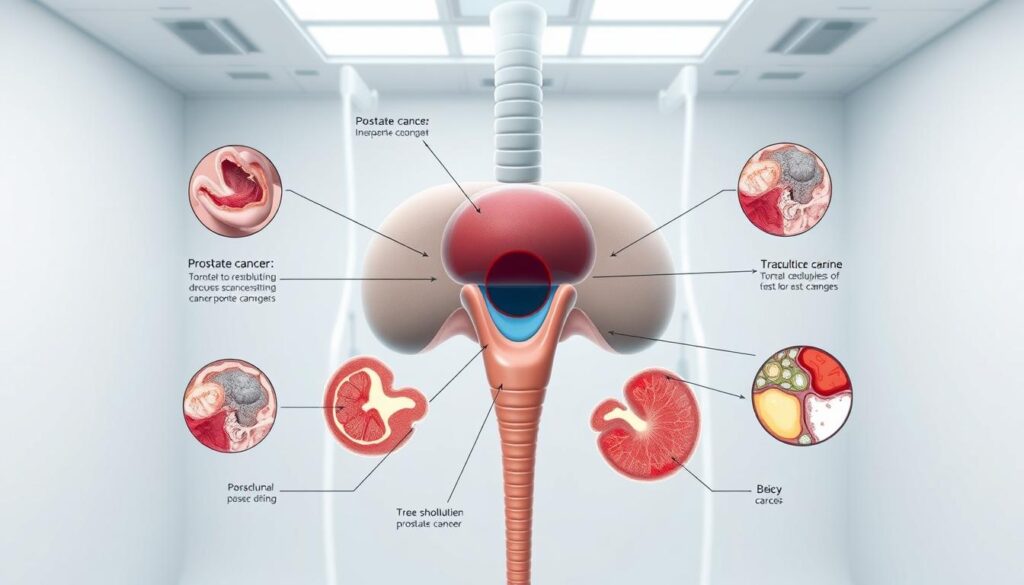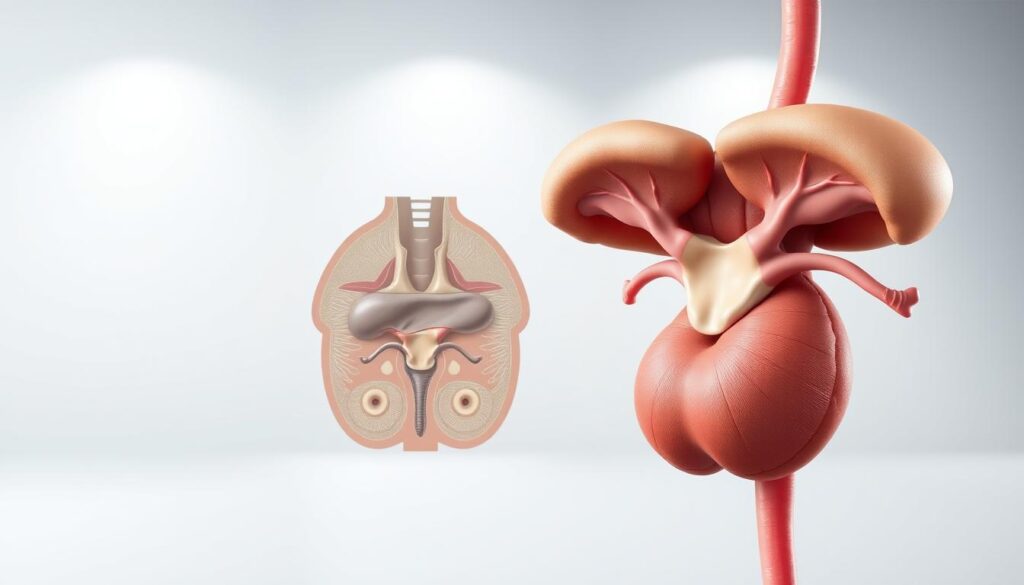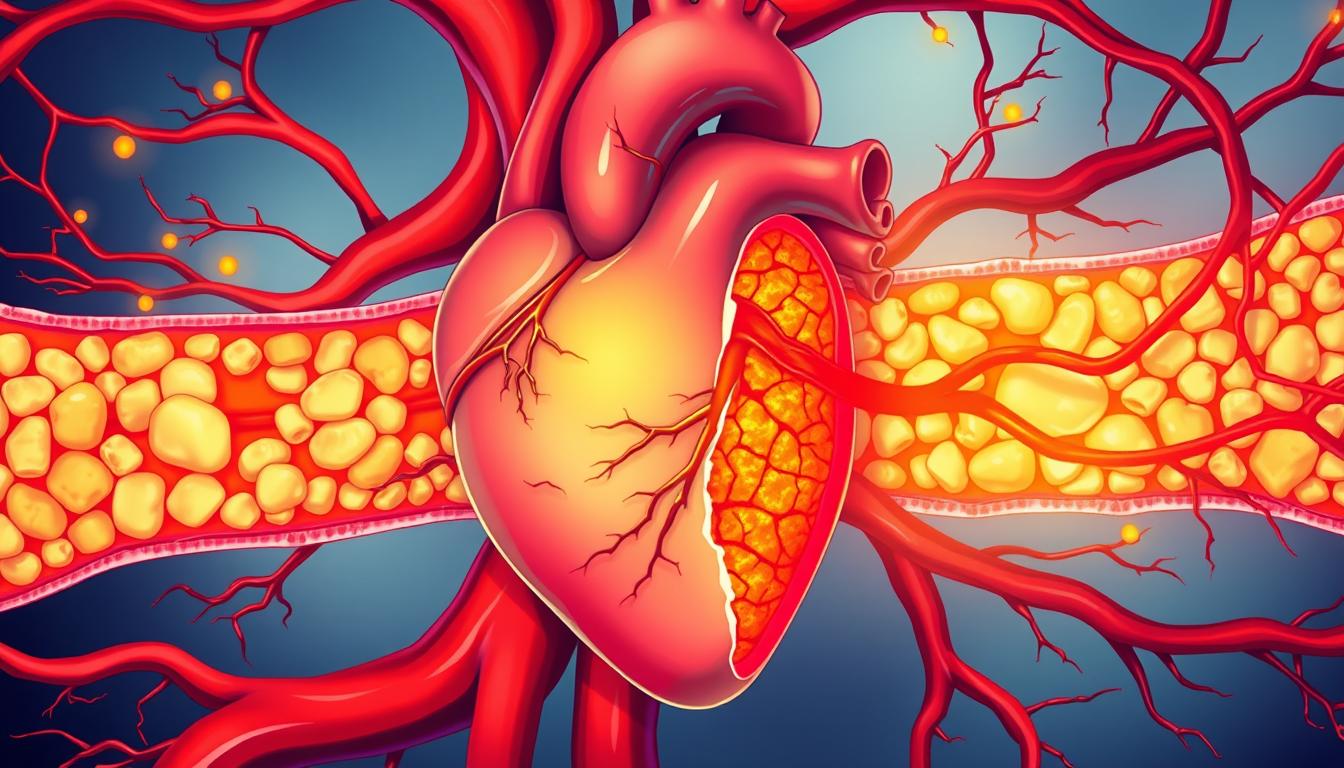Did you know prostate cancer is the second most common cancer in men in the U.S.? If you’re like many, you might wonder what it means for your health. Knowing about prostate cancer is key to catching it early and managing it well.
Being aware of prostate cancer can change your life and the lives of those you care about. This article will help you understand the importance of prostate health. It will also give you the knowledge you need to make smart health choices.
Key Takeaways
- Prostate cancer is the second most common cancer among men in the U.S.
- Early detection can lead to more effective treatment outcomes.
- Understanding your risk factors is important for prevention.
- Prostate health can be influenced by lifestyle choices.
- Regular check-ups with your doctor are crucial.
Introduction to Prostate Cancer
Prostate cancer is a big worry for men’s health. It’s very common in the United States. About 1 in 8 men will get prostate cancer at some point.
This shows how important it is to know about prostate cancer. Early detection is key.
Prostate cancer grows slowly. Many men don’t feel symptoms early on. Regular check-ups are very important.
By staying informed and proactive, you can handle prostate cancer better.

Understanding Prostate Cancer: The Basics Every Man Should Know
The prostate gland is key in the male body. It helps with making babies. Knowing about the prostate can help spot health problems like prostate cancer.
What is the Prostate?
The prostate is a small gland near the bladder. It surrounds the urethra. It makes seminal fluid, which helps sperm.
This gland is important for making babies. Any problems with it can hurt sexual health and make babies.
What is Prostate Cancer?
Prostate cancer happens when prostate cells grow wrong. It often grows slowly and may not show symptoms early.
Changes in urination or pain are signs. Spotting these early can help. It’s key for men to know the signs and what they mean for their prostate function.

Prostate Cancer Symptoms
It’s key to know the signs of prostate cancer early. This helps in getting the right treatment fast. Symptoms like urinary problems and discomfort are common.
Common Symptoms to Watch For
Men with prostate cancer might show signs like:
- Frequent urination, especially at night
- Difficulty starting or stopping urination
- Painful urination
- Lower back pain
These signs can mean different things. It’s important to know what they mean for your health.
When to See a Doctor
If you notice these symptoms, see a doctor. They can check if it’s serious. Don’t ignore any discomfort or urinary issues. They might be signs of a bigger problem.
Prostate Cancer Risk Factors
Knowing about prostate cancer risk factors is key for early detection and prevention. Age, ethnicity, genetics, and lifestyle choices can affect your risk. By understanding these, you can take steps to protect your health.
Age and Ethnicity
Age is a big factor in prostate cancer risk. Men over 65 face a higher risk. This age group has much higher rates than younger men.
Also, ethnicity plays a role. African American men have a higher risk than others. This means we need to screen different groups early.
Family History and Genetics
A family history of prostate cancer raises your risk. If your dad or brother had it, you might be at higher risk. Genes like BRCA1 and BRCA2 can also play a part.
Knowing your family’s health history can help you understand your risk.
Diet and Lifestyle Choices
Your diet and lifestyle can impact your risk. Eating a lot of red meat and not enough fruits and veggies can increase the risk. But eating well and staying active can help protect you.
Prostate Cancer Prevention
Living a healthy lifestyle is key to avoiding prostate cancer. Making small changes in your daily life can greatly improve your health. Eating right, exercising, and keeping a healthy weight are important for your overall health and prostate.
Healthy Lifestyle Choices for Prostate Health
Eating well means lots of fruits, veggies, whole grains, and lean meats. Research shows some foods are good for your prostate:
| Nutrient | Sources | Benefits |
|---|---|---|
| Tomatoes (Lycopene) | Tomato sauce, tomatoes, watermelon | It may reduce prostate cancer risk. |
| Omega-3 Fatty Acids | Fatty fish, walnuts, and flaxseeds | May lower inflammation and improve overall health. |
| Fiber | Whole grains, beans, and fruits | Promotes digestive health and may lower the risk. |
| Cruciferous Vegetables | Broccoli, cauliflower, kale | May support detoxification and cancer prevention. |
Being active is also crucial. Exercise keeps you at a healthy weight and boosts your immune system. This helps fight prostate cancer.
Importance of Regular Check-Ups
Going for regular health checks is vital. They help find problems early. Talking to your doctor about your family history can help you get the right advice.
Prostate Cancer Treatment Options
When you get a prostate cancer diagnosis, knowing your treatment options is key. These options change based on your cancer’s stage and your health. It’s vital to know about each choice.
Overview of Available Treatments
Here are some common treatments for prostate cancer:
- Active Surveillance: Watching the cancer without starting treatment right away.
- Surgery: Taking out the prostate gland and some nearby tissue. This is for early cancer.
- Radiation Therapy: Killing cancer cells with high-energy waves. It’s external or brachytherapy.
- Hormone Therapy: Lowering male hormones to slow cancer growth.
- Chemotherapy: Using drugs to kill cancer cells. This is for advanced cancer.
Considerations for Choosing Treatment
Choosing the right treatment is a big decision. Think about:
- Your age and health.
- The cancer’s stage and grade.
- Your lifestyle and what you prefer.
- The side effects and risks of each treatment.
Innovations in Prostate Cancer Treatment
New tech brings new treatments. Recent advances include:
- Ablation to kill cancer cells safely.
- Targeted therapies to attack cancer without harming normal cells.
- Immunotherapy to boost your body’s fight against cancer.
Knowing about these treatments helps you talk to doctors. Making a smart choice can change your treatment path.
Conclusion
Knowing about prostate cancer is key for every man. It helps you take care of your health. Prostate cancer awareness means knowing the signs, risks, and the need for early tests.
By staying informed, you can make smart health choices. These choices can shape your future. Regular tests, a healthy lifestyle, and using health resources are important steps.
These steps help keep you healthy and catch cancer early if it happens. Taking action now can lead to better health later.
Your efforts to know about prostate health help you and others. It starts a conversation about men’s health. Encourage friends to care about their health, too. This builds a community that values learning and staying healthy against prostate cancer.













